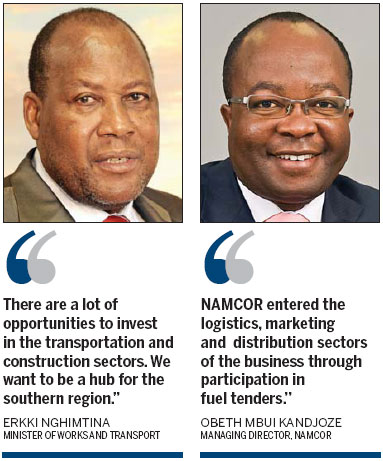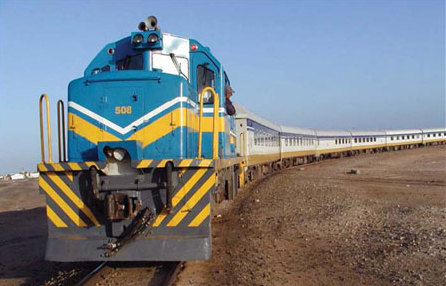Major investment in logistics drives success
(China Daily) Updated: 2013-09-11 08:12Namibia steps closer to being international hub
With an area of nearly 825,000 square kilometers, Namibia faces a challenge as it looks to establish itself as an international logistics hub through the development of an extensive transportation network.
The country is working very hard to attract substantial foreign direct investment in its road, rail, air and sea transport infrastructure and services, with the government eager for investors to transfer their skills and knowledge to the Namibians. The public works will go a long way to realizing Namibia's goal of becoming a major logistics hub for the Southern African Development Community.
"We need to build roads and construct efficient railways between Namibia and Botswana, Zambia and Angola," said President Hifikepunye Pohamba. "Work has already started on this network and will serve as an attraction to investors to the region."
A key goal of NDP4, the nation's development blueprint, is that by 2017, "the volume of cargo handling and rail-transported cargo will double that of 2012, and the Port of Walvis Bay will become the preferred African west coast port and logistics corridor for southern and central African logistics operations."
The comprehensive document stated: "Rapid development in the realm of logistics is made possible only when both the public and the private sector share a common goal and framework for implementation.
"There are various building blocks for creating a logistics nation, including public investment in infrastructure, efficient operation by private-sector companies, strong support and cooperation from local government, and international cooperation and facilitation at cross-border areas.
"To make Namibia a logistics nation, the government will therefore continue to pursue various international and bilateral agreements in setting one-stop border posts to ensure the flow of cross-border trade is as efficient as possible.
"Aggressive investment will characterize efforts to develop our internal human resources capacity in order to manage all the components of the regional logistics hub and attract foreign skills."
Tasked with implementing this wide-ranging strategy and providing Namibia with a safe and reliable transport system is the Ministry of Works and Transport.
"We have to make sure that we have facilities that allow investors and tourists to come to Namibia," said Erkki Nghimtina, Works and Transport Minister.
Major challenge
"The major challenge is infrastructure development. We want to be a hub for the southern region. Those facilities are not only for us but also to assist our neighbors. We've developed corridors to other countries so we can trade freely between our countries and also for the transportation of goods from the Port of Walvis Bay."
He added: "If you construct a road today, tomorrow a lot of development will come along. When there are roads, people will come, establish themselves and make the market. There are a lot of opportunities to invest in the transportation and construction sectors. We want them to come, bring money and develop the country, and work together with us."
The Walvis Bay Corridor Group is a public-private partnership that joins the forces, capabilities and common objectives of the key institutions in the transport sector in order to streamline the costs of transporting goods and services within Namibia.
The group takes a holistic view of logistics by working with the relevant government agencies, ministries and government-owned corporations as well as private-sector companies.
One additional aim of the group is to promote the benefits of using the Port of Walvis Bay to traders wanting to sell their goods within the Southern African Development Community region. To achieve this, the group said they must convince traders that the Port of Walvis Bay is more competitive in terms of cost and efficiency than the competing ports of Durban, in South Africa, and Luanda, in Angola.
Roads key to growth
Driving such transport infrastructure development is the Roads Contractor Company Ltd - or RCC in short. The firm is Namibia's largest civil engineering company and works in the construction and maintenance of roads throughout the country.
RCC competes for road construction and rehabilitation projects with other private contractors and welcomes Chinese investors in the sector, as they can compete strongly on price, which ultimately drives down the costs of infrastructure projects - a plus for the economy.
As RCC CEO Engelhard Haihambo explained: "Road infrastructure can be viewed as the conveyor-belt of economic development. We produce and maintain that belt.
"When the country is embarking on any economic development program, we play the role of being a valuable choice in terms of creating that conveyor belt."
Having worked with Chinese companies for many years, Haihambo noted some of China's competitive advantages.
"Chinese people are not only hardworking but smart. They finish up projects on time. If you are a contractor and you get the opportunity to finish a construction project earlier, then you would be a sustainable, profitable contractor. We have picked up a lot of tricks and techniques on how they are doing that. One of the things we have observed from the Chinese is that they have a very good supply chain.
"When we talk about Chinese value added role in infrastructure development, we must not focus only on the physical construction part, we need to start from the design. We have a tendency in our country of designing infrastructure based on the past designs. There is an urgent need to look at new way of designing. We need to be innovative and move on in step with developments as they happen worldwide.
"Countries such as China, with its strong, innovative approach towards things and continuous renewal of projects, should be given space during the design stage of the infrastructure projects."
One firm heavily reliant on road and rail networks for its distribution activities is oil giant NAMCOR.
"We entered the logistics, marketing and distribution sectors through participation in fuel tenders in line with its new strategy of building an integrated oil company that would compete on an equal footing with other industry players," said NAMCOR managing director, Obeth M. Kandjoze.
InFocus provided the story
|
Namibia's government has given the green light to investment in transport infrastructure, such as railways. Provided to China Daily |

(China Daily 09/11/2013 page6)






